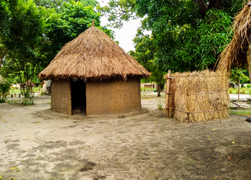Ngoni (peuple)
Apparence
(Redirigé depuis Angonis)
Les Ngoni sont des populations de langue bantoue d'Afrique australe faisant partie du groupe Nguni, surtout présent dans le centre du Malawi, de l'autre côté de la frontière au Mozambique et en Tanzanie, également en Zambie.
Ethnonymie
[modifier | modifier le code]Selon les sources et le contexte, on observe les formes suivantes : Angoni, Gwangara, Mangoni, Mazitu, Ngonis, Wangoni[1].
Langues
[modifier | modifier le code]Les Ngoni du Malawi[2] utilisent le chewa. Au Mozambique et en Tanzanie ils parlent le ngoni[3], une autre langue bantoue.
Culture
[modifier | modifier le code]- En Tanzanie.
-
Maison et toilettes.
-
Foyer.
-
Mobilier.
Notes et références
[modifier | modifier le code]- Source RAMEAU, BnF [1]
- (en) Fiche langue
[nya]dans la base de données linguistique Ethnologue. - (en) Fiche langue
[ngo]dans la base de données linguistique Ethnologue.
Voir aussi
[modifier | modifier le code]Bibliographie
[modifier | modifier le code]- (de) Karl Weule, Wissenschaftliche Ergebnisse meiner ethnographischen Forschungsreise in den Südosten Deutsch-Ostafrikas, Mittler, Berlin, 1908, 150 p.
- (en) John Arundel Barnes, Politics in a changing society : a political history of the Fort Jameson Ngoni, Institute for Social Research, University of Zambia, by Manchester University Press, 1967 (1re éd. 1954), 245 p.
- (en) Yesaya Mlonyeni Chibambo, My Ngoni of Nyasaland (trad. Charles Stuart), Lutterworth Press, Londres, 1942, 63 p.
- (en) Walter Angus Elmslie, Among the wild Ngoni : being some chapters in the history of the Livingstonia Mission in British Central Africa, Cass, Londres, 1970 (facsimile de l’édition de 1901), 319 p. (ISBN 0714618675)
- (en) Donald Fraser, Winning a primitive people : sixteen years' work among the warlike tribe of the Ngoni and the Senga and Tumbuka peoples of Central Africa, Seeley, Service, Londres, 1914, 320 p.
- (en) P. H. Gulliver, Labour migration in a rural economy : a study of the Ngoni and Ndendeuli of Southern Tanganyika, Kampala, Uganda : East African Institute of Social Research, Kampala (Ouganda), 1955, 48 p.
- (en) Reinhard Klein-Arendt, Bridging the unbridgeable : historical traditions of the Ngoni of Northern Malawi, Köppe, Cologne, 2003, 93 p. (ISBN 3-89645-275-4)
- (en) Steven Phaniso Chinombo Moyo, A linguo-aesthetic study of Ngoni poetry, University of Wisconsin-Madison, 1978 (thèse)
- (en) Desmond Dudwa Phiri, Inkosi Gomani II : Maseko-Ngoni paramount chief who suffered martyrdom for his people and country, Longman Malawi, Blantyre, 1973, 62 p. (ISBN 0582601312)
- (en) Margaret Read, The Ngoni of Nyasaland, Cass, Londres, 1970 (1re éd. 1956), 212 p. (ISBN 0714626074)
- (en) Margaret Read, Children of their fathers : growing up among the Ngoni of Malawi, 1968 (1re éd. 1959), 97 p.
- (en) Patrick M. Redmond, The politics of power in Songea Ngoni society, 1860-1962, Adams Press, Chicago, 1985, 225 p.
- (en) Masiye Tembo, Touched by his grace : a Ngoni story of tragedy and triumph, Kachere Series, Zomba (Malawi) ; Michigan State University Press, East Lansing, 2005, 84 p. (ISBN 99908-7631-2)
- (en) Jack Thompson, Christianity in northern Mala¤i : Donald Fraser's missionary methods and Ngoni culture, E.J. Brill, Leyde, New York, 1995, 292 p. (ISBN 90-04-10208-6)
- (en) Jack Thompson, Ngoni, Xhosa and Scot : religious and cultural interaction in Malawi, Kachere Series, Zomba (Malawi), 2007, 170 p. (ISBN 978-99908-8717-4)
- (fr) Boston-Jaston Soko, Stylistique et messages dans le Vimbuza : essai d'étude ethnolinguistique des chants de possession chez les Ngoni-Tumbuka du Malawi, 1900-1963, Université de Paris 3, 1984, 650 p. (thèse de 3e cycle)
- (pt) Maria Leonor Correia Matos, Notas sôbre o direito de propriedade da terra dos povos Angoni, Acheua e Ajaua da província de Moçambique, Instituto de Investigação Científica de Moçambique, Lourenço Marques, 1965, 127 p.
Articles connexes
[modifier | modifier le code]- Démographie au Malawi
- Démographie en Zambie
- Démographie de la Tanzanie
- Démographie du Mozambique
- Liste des groupes ethniques d'Afrique




